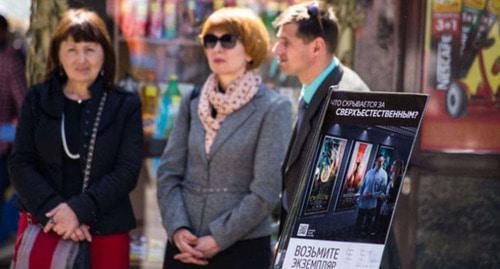
16 August 2018, 14:09
Persecutions of Jehovah's Witnesses in Southern Russia remind Soviet repressions
In the Stavropol Territory, law enforcers detained two Jehovah's Witnesses to check their involvement in extremist activities; however, later they were released, Yaroslav Sivulsky, a representative of the European Association of Jehovah's Witnesses*, has stated. In general, Jehovah's Witnesses* are now almost in the same situation as in the Soviet era, said Alexei Makarov, a rights defender.
The "Caucasian Knot" has reported that on April 20, 2017, the Russian Supreme Court satisfied the demand of the Ministry of Justice to liquidate all the Russian organizations of Jehovah's Witnesses as extremist ones.
In the afternoon on August 7, in the settlement of Tunnelny, Kochubey District of the Stavropol Territory, Artyom Shpak, who was serving his alternative civilian service, was detained, while his cousin, Vitaly Shpak, was detained in the neighbouring village. Law enforcers accused them of participating in the extremist organization of Jehovah's Witnesses. However, on the next day, they both were released, as Yaroslav Sivulsky told the "Caucasian Knot" correspondent on August 15.
In the regions of the Southern Federal District (SFD) and Northern Caucasus, like in all other regions of the Russian Federation, all the property is confiscated from the banned local religious organizations of Jehovah's Witnesses*. Along with this, some individual adherents of Jehovah's Witnesses* are also persecuted, Mr Sivulsky has added.
In part, persecution methods of Jehovah's Witnesses* in Soviet times and today are similar, said Alexei Makarov, an employee of the International "Memorial".
He believes that in general Jehovah's Witnesses* are now placed almost in the same situation as in the Soviet era. "Their religious organizations were not registered in the USSR as well, and their confession was actually banned. While adherents of some faiths, such as Baptists, for example, also undesirable, according to Soviet authorities, could conduct at least limited religious activities, since some of their communities got registered, Jehovah's Witnesses* had no such practice in the USSR; while any participation in unsanctioned religious activities was criminally prosecuted there," Mr Makarov has explained.
*The organization of Jehovah's Witnesses was recognized as extremist; and its activities in Russia have been banned by the court.
This article was originally published on the Russian page of 24/7 Internet agency ‘Caucasian Knot’ on August 16, 2018 at 06:17 am MSK. To access the full text of the article, click here.
Author: Rustam Djalilov Source: CK correspondent




